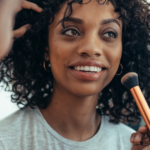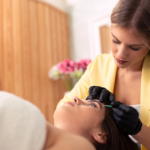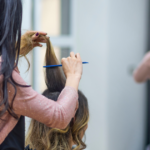
A makeup artist uses cosmetics and other beauty products to enhance the appearance of customers. Makeup artists are sometimes also called cosmetologists or beauticians, but they actually specialize only in makeup and usually do not offer other beauty services.
The history of makeup can be traced to ancient Egypt, where the pharaohs and other prominent individuals of the court directed trained servants to apply what today we would consider primitive cosmetics. Their goal? To look more like the gods they worshipped.
Today makeup artists work with private individuals, actors and actresses, politicians, and television, theater and film productions. When working on an artistic production, the makeup artist is part of a team that includes the hair stylist, wardrobe specialist and other assistants.
The fashion and entertainment industries employ the most makeup artists today. You can also find work in spas and beauty salons or start your own.
The work pays well and comes with the professional satisfaction of helping people feel great about their appearance. Ready to get started on an exciting and artistic career path? Read on.
In this article you’ll learn:
- How much money you can make as a makeup artist
- The required training and certifications
- Professional groups to join
- Employment opportunities for makeup artists
- Finding clients
- Plus helpful tips
How much money can you make?
The average salary for a makeup artist is $59,300 per year, according to the US Bureau of Labor Statistics. That works out to $30.89 an hour based on a 40-hour work week. The top 10 percent of makeup artists are earning $127,030 per year on average, the BLS reports. Employment opportunities for makeup artists are expected to grow by 8 percent through 2028, which is faster than the national average for all occupations.
Training and Certification
To become a makeup artist, you’ll need specific training. Generally, there are two options. Many businesses and spas offer certified makeup courses onsite led by licensed instructors. You can also complete courses online. Before you begin a course, ensure that they are fully licensed and certified to give you the qualifications that you need. Be sure to check the reviews by students who have been enrolled in a training program.

Makeup artists may not need a license to operate, depending on the state where they live. State boards of cosmetology set the licensing requirements for Cosmetologists and Estheticians (both of whom can work as a makeup artist), but this is not always specific to makeup artists.
Here is a state-by-state directory of licensing requirements for makeup artists so you can research what’s involved in your specific situation.
Freelance makeup artists typically do not require a license – but again, this depends on the state – so it is best to conduct your own research into the licensing requirements where you live. By becoming trained and certified as a licensed makeup artist, you are likely to have less competition as clients will understandably feel more confident in a certified professional. Some states also have age restrictions in place for training and employment, as well as minimum education requirements such as a high school diploma or GED. Most states also require makeup artists to be at least 16 years old.
Here is a list of makeup artist schools and programs you can review to see if any would be a good fit for your needs.
Professional Groups to Join
International Association of Professional Makeup Artists
The IAPO International Association of Professional Makeup Artists is a membership association created to provide education and business development services for people working as, or studying to become, a professional makeup artist. Membership ranges from about $24 per year for students to $50 a year for working professionals.
Professional Beauty Association
Members include stylists, makeup artists, manufacturers, distributors, freelancers, employees, salons, spas, suppliers, beauty schools, and students. PBA’s mission is to unite members while providing valuable resources – including affordable insurance – support and connections to help elevate and grow careers and the industry. A professional membership costs $50 a year.
Employment
Professional makeup artists may face a bewildering range of employment options, each with different benefits and potential drawbacks. These are the most common employment types:

Independent Contracting with Booth Rental
In this arrangement the makeup artist pays a salon or spa a rental fee for access to the facilities. As independent contractors, booth renters buy their own supplies, set their own working hours and fees, and provide their own business insurance. You are completely in control of your earnings. With an established business and steady clients, independent contracting may be right for you.
Hourly Pay + Commission
Many salons and spas pay their makeup artists a low hourly wage plus commission, which is based on a percentage of how much business you produce. So if you delivered $500 worth of services to clients and receive a 20% commission on gross sales, you’d be paid $100 plus your pre-arranged hourly wage.
Team Member Compensation
With this employment arrangement, you receive a base salary plus commissions on your services and any products you sell to clients. If salesmanship is a skill you possess or are willing to learn, this compensation package might be right for you.

Straight Salary
You earn a yearly salary and probably receive benefits like health insurance and paid time off. Straight salary jobs are usually found in professional settings such as medical spas. You offer your makeup services and are typically under no pressure to sell products while working with clients.
If you’re just starting out, it may not be financially practical to open your own studio at first. This means working for someone else. An up-to-date resume and copies of your certifications are essential parts of your application. Online job-search services such as Indeed.com and ZipRecruiter will yield openings.
Join makeup discussion groups on social media so you can build your professional network. Set up your professional profile on LinkedIn to start connecting with other makeup artists and groups whose members may know about upcoming job openings before they’re advertised.
Finding Clients
When running your own makeup business, an attractive website is vital. It is, in fact, the professional face of your business that potential new clients will likely see first. If you’re not comfortable designing a website yourself using templates and artwork from popular sites like WordPress, hire someone to build a basic website for you. Just get an online presence going and keep it up-to-date with photos and occasional special offers to drive traffic to your door, discounts for new customers, maybe even a price break for existing clients who refer new customers to you.
Get on Instagram. Post lots of pictures of your work. Before and after photos work well. Be sure to get permission from your clients to post their pictures online, unless you’re using extreme close-up shots (such as makeup around the eyes and cheeks) where the individual cannot be identified.

Build your credibility with online reviews. According to a recent survey, 90% of participants are influenced by positive online reviews. Ask happy clients to post a review for you.
Have all new customers fill out a basic form about their interest in your services and be sure they include their contact information. Your web site can be set up to require contact information before the form can be submitted. You want contact information so you can follow-up with all your clients. This encourages repeat business.
Good to know
Here are some insider beauty tips and tricks from professional makeup artists.
Cheeks
Add blush to the cheeks before you apply foundation. This creates a glow that looks like it’s coming from beneath the skin.
Halloween is a great time to stock up on some unusual essentials for your makeup kit. Fake blood is often used as a blush shade because it looks like a natural flush of color coming through the skin.
Face
Mix foundation with moisturizer to lighten your coverage options.
To thicken foundation, mix in a pinch of loose powder.
Mix foundation with a golden or pearl-white eyeshadow to create a luminous skin effect.
For oily skin, if you don’t have any face primer, apply a little corn starch, instead, before adding foundation.
Complexion products such as foundation and concealer should match the color shade on the inside of the client’s arm, not the back of the hand.
Eyes
Reduce puffiness by putting eye lotion in the refrigerator freezer and apply to the eyelids before makeup.
Extend the life of your mascara by adding a few drops of saline solution and swirling the brush around.

Lips
Apply a lip color that has the same undertone as the client’s complexion. The rule is cool works with cool, warm with warm.
Test lipstick on your fingertip, not the back of your hand. The pad of your fingertip more closely resembles the lip color. This is the right trick to decide which lipstick looks best.
Pull down on the client’s bottom lip to examine the inside color. Now select a lipstick shade that’s either lighter or a bit deeper as the inside of the lip.
Applying concealer to the outer corners of the lips can give the lips a lift.
Eyebrows
Apply primer all the way up into the brows so the brow color won’t change.
Lift brow hair with a spoolie brush to figure out exactly where they need to be filled in. Then use a slim eyebrow pencil to draw symmetrical outlines of each eyebrow. Start at the bottom of the brow and lightly outline their natural shape.
If you enjoyed this article, check out some more great PocketSuite.io content that can help you grow your career as a makeup artist. Here’s a great place to start.
PocketSuite has thousands of business owners who all started where you are right now. Our community is always happy to help you ramp up, grow your client base, and achieve your income goals, both within the PocketSuite app and as part of our exclusive Facebook Community Group. PocketSuite’s vision is for any professional to be able to work for themselves and make a great living. It starts here. It starts with you. It starts today. Let’s get started, download PocketSuite now! Feel free to reach out with any questions (we’d love to hear from you)! Text us @ (415) 841-2300.





